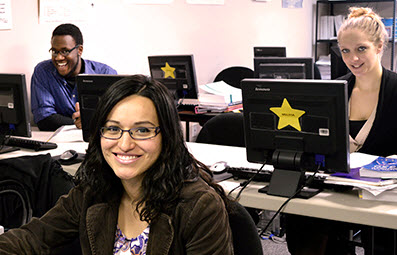If you’ve ever had any questions about vocational rehabilitation, you’ve come to the right place.
Keep reading to find my definitive guide on vocational rehabilitation, updated for 2019 so it has all the information you need to make the most of it.
- 1CHAPTER 1What Is Vocational Rehabilitation
- 2CHAPTER 2Vocational Rehabilitation Services
- 3CHAPTER 3Vocational Rehabilitation Counselor
- 4CHAPTER 4Vocational Rehabilitation Act
- 5CHAPTER 5Vocational Rehabilitation Programs
- 6CHAPTER 6Department of Vocational Rehabilitation
- 7CHAPTER 7Occupational Rehabilitation
- 8CHAPTER 8Vocational Rehabilitation FAQS
What Is Vocational Rehabilitation?
Vocational rehabilitation is defined as a process that a disabled individual goes through in order to gain, maintain, or return to employment.
There are a number of individuals that work together to help you through this process.
You may find yourself working with people in the medical field as well as career counselors and other advisors.
Your individual needs will determine how many people you work with and what roles are needed to aid in your successful entry into the workplace.
These needs will also determine the length and overall complexity of the process.
As you will see later, what services are available to you will be determined partly by the area you live in as not all services are available in every state.
Who Can Benefit from Vocational Rehabilitation?
To avoid just anyone from gaining benefits of vocational rehabilitation, you must first prove your eligibility to the governing agency.
The easiest way to do this is to show that you are getting SSI (Supplemental Security Income) or SSDI (Social Security Disability Insurance).
Special education students and others who receive additional accommodations in school may also be eligible along with individuals with severe health conditions.
Otherwise, here are the eligibility requirements for vocational rehabilitation services:
- You must have a physical, emotional, mental, or learning disability that prevents you from being able to hold a job.
- You need the help of vocational rehabilitation services in order to get, maintain, or return to a job.
- You will benefit from having a job that vocational rehabilitation services will help you get and keep.
Vocational Rehabilitation Services
There are a number of services offered to you if you are able to take part in vocational rehabilitation.
Keep in mind that not all of these services will apply to your situation and not all will be available in every state.
These are the vocational rehabilitation services that may be available to you:
- Assessment of your current state.
- Researching options for you based on assessments.
- Helping you set goals for yourself.
- Planning interventions.
- Providing you with health advice to help you return to work.
- Finding ways to limit the impact of your condition on your ability to work.
- Helping you learn to self-manage your condition.
- Managing your case.
- Referring you to other people who can help with your case.
- Co-ordinating people to provide the best service for you.
- Career counseling.
- Analyzing and developing job opportunities.
- Providing job placement services to get you into a job.
- Ongoing evaluations of your ability to work.
It’s easy to see how these services will allow you to find and keep a job no matter what disability you are struggling with.
Despite the number of people that will likely be involved in your case, you will probably primarily work with just one person, a vocational rehabilitation counselor.
Vocational Rehabilitation Counselor
The role of a vocational rehabilitation counselor is to help their client overcome barriers to be able to work in some capacity.
They will typically have a master’s degree in vocational rehabilitation or else counseling psychology.
If you are able to enroll in a vocational rehabilitation program, this will be the person that you will be working with the most.
They will be the one to bring in other professionals as needed and will be responsible for creating a plan for your rehabilitation.
Here are a couple things to keep in mind when working with your vocational rehabilitation counselor:
- Always be honest about your condition, abilities, restrictions, and desires so they can help you as much as possible.
- Respect their decisions in regards to your next steps towards employment since they know what they are doing.
- Communicate frequently with them about any problems or concerns you are having so small problems can be solved while they’re still small.
It’s important to establish a positive relationship with your vocational rehabilitation counselor because of the huge role they will be playing in helping you get a job.
Of course, if you feel like they’re not doing their job well, then you may consider requesting a new vocational rehabilitation counselor to take over your case.
Vocational Rehabilitation Act
Because there was a lot of discrimination in the workplace against people with disabilities throughout the United States, the Vocational Rehabilitation Act of 1973 Title V was created.
This act did several things to ensure that people of all abilities can work.
Here are a few of the actions that came as a result of the Vocational Rehabilitation Act:
- Employers that have federal contracts of at least $2,500 are required to hire mentally or physically disabled individuals.
- Employers must now make reasonable accommodations for employees with disabilities.
- Programs were put in place to offer training assistance, vocational counseling, and job placement for severely disabled individuals.
Vocational Rehabilitation Programs
The following are just a few examples of vocational rehabilitation programs that are available in various states across the United States.
Florida Alliance for Assistive Services and Technology (FAAST)
This program is designed to create a partnership between the government and business owners.
Their goal is to allow disabled individuals to have access to services and technology they need to be able to live independently and enjoy everything life has to offer them.
California’s Limited Examination and Appointment Program
If you’re looking for a state job in California, be sure to look into the Limited Examination and Appointment Program.
It was created to make the examination process easier for disabled individuals so that they could more easily get the position they wanted.
Michigan Rehabilitation Services Farm Rehabilitation
This program deals specifically with farmers who have become disabled, whether it was as a result of a disease or an injury.
The goal is to help Michigan farmers or those who work for fisheries or in the logging industry to allow them to continue working even after they have become disabled.
New York’s Individualized Plan for Employment (IPE)
Also referred to as the “road map to employment,” this program is designed to help you reach whatever employment goal you have.
Creators of IPE understood the importance of setting personal goals in order to help you reach them.
Georgia Industries for the Blind (GIB)
First put into place in 1937, this program employs the visually-impaired in Griffin and Bainbridge.
It currently has almost 100 blind individuals working in two different locations.
This gives each person the chance to be productive and hold a job.
South Dakota’s Interpreter Services
This service offers interpreters to ensure that an individual is able to communicate during the vocational rehabilitation process.
Interpretation services are most commonly used by deaf and hard of hearing individuals, but other types of language interpretation services are also available.
Department of Vocational Rehabilitation
Every state has its own department of vocational rehabilitation with its own list of services it provides.
While most states will have something to cover every type of disability, others have more limited options to choose from.
For more information about what your state has to offer, give their department of vocational rehabilitation a call to find out more.
A representative of the department will be able to provide you with a complete list of services and help you find one that will work for you.
Occupational Rehabilitation
If you incur an injury while in the workplace, you may require occupational rehabilitation before resuming your job duties.
Occupational rehabilitation is designed for workers who have incurred injuries that render them incapable of performing their work effectively.
It refers to the science and process of returning injured workers to their usual functional and cognitive capacity, and depends on the severity of the injuries.
Professionals Involved
Occupational rehabilitation involves a number of professionals, including physiotherapists, occupational physicians, kinesiologists, physiotherapists, and, of course, occupational therapists.
An occupational therapist can help you deal with the physical and emotional demands of your job so that you can be able to return to work as rejuvenated as possible.
If necessary, they can also recommend downgrading your job demands in the meantime to avoid further injury.
Occupational Rehabilitation And Common Mental Disorders
Working in a stressful environment can make you susceptible to certain mental disorders that may compromise your working ability.
Occupational rehabilitation is also used to help workers cope with various mental disorders in the workplace, including depression, suicidal thoughts, addiction-related disorders, alcohol dependence, and anxiety disorders.
This often involves using a graded environment where barriers are eliminated in order to boost performance and self-esteem.
Vocational Rehabilitation FAQS
What Should I Bring to My First Meeting with a VR Counselor?
To determine whether you are eligible for vocational training services, you need to have up-to-date medical information detailing your disability.
As such, it is important to carry any medical records that may help in the evaluation process.
You should also include any disability-related records you have, for example OT/PT Speech Reports, Vocational Evaluation, Current Class Schedule, Current IEP, Transcript of Grades, Reading Evaluation, WISC/WAIS and Psychiatric/Psychological Evaluations.
What Are My Responsibilities?
Your counselor can help you work out your responsibilities during vocational training, but you are expected to do everything you can in preparation for a job.
This includes keeping appointments, complete participation in the Employment plan, working hard on tests and in the training, discussing problems as they arise, and keeping in touch with your vocational counselor.
What Are My Counselor’s Responsibilities?
Disabilities can be a hindrance to job performance, and your counselor understands this.
Their role is to help you identify and utilize your strengths in the workplace.
They can advise you on how to choose the most suitable job for your strengths; provide information, alternatives, and support; and help you get the services that are necessary to find and keep a job.
At What Point Does Vocational Rehabilitation Services Become Involved in the Transition Process?
The transition process can be initiated if the first IEP (Individualized Education Program) has been implemented by the age of 16.
However, the transition team can decide to begin earlier if they find it appropriate.
If you are interested in VR services, it is advisable to apply two years before exiting from school.
You can also apply earlier if:
- Your disability needs will demand more extensive, long-range planning.
- You are at risk of legal involvement or dropping out of school.
What Services and Information Are Provided to Schools by VR Services?
Vocational Rehabilitation Services can be a great source of information for schools.
They provide: Labor Law information; Employer contacts; and current employment-related trends and events happening in the region.
They can also help you learn employers’ expectations of employees, connect workplace activities with your academic program, and discover the significance of disabling conditions on employment.
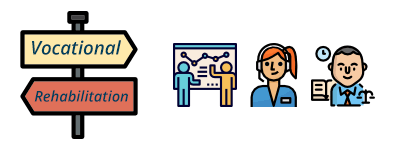
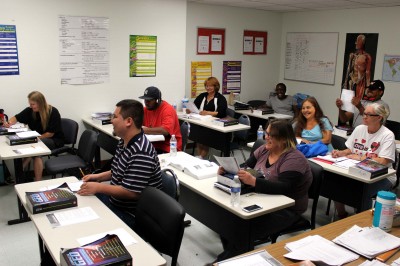

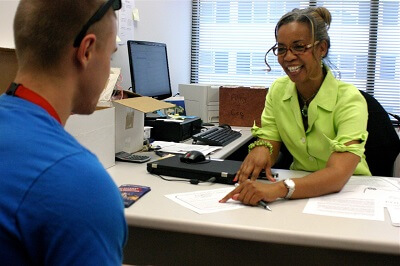
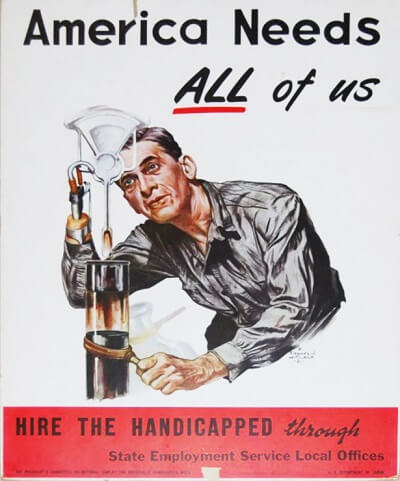


 Vocational Rehabilitation By State
Vocational Rehabilitation By State